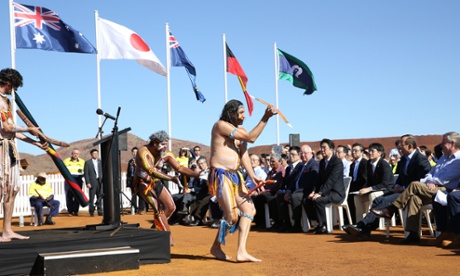Were Tony Abbott to praise Indigenous fighting skill, what would it mean?
When Tony Abbott praised the skill and honour of Japanese soldiers, he was licensing Japan's domestic politics. That's why he won't say the same about the frontier wars

"The past is never dead. It’s not even past."
William Faulkner’s words came to mind when Tony Abbott admired the "skill and the sense of honour that [Japanese soldiers] brought to their task" during the second world war.
In the abstract, Abbott’s comments might sound innocent but, of course, they were uttered, as the prime minister understands quite well, in a particular context.
For Japan’s rightwing, the second world war still matters immensely. Japanese nationalists – such as Shinzo Abe, the current prime minister – have made the nation’s military history a cause célèbre, part of a campaign to reshape the nation today.
Abe has, for instance, visited the graves of executed war criminals, denied that Japan maintained a puppet state in Manchuria, and belittled the army’s sexual slaves, the so-called comfort women.
If Japan’s past can be rehabilitated, it’s much easier to argue for a militarised future – and so revisionism about the crimes of imperial Japan has gone hand in hand with the reinterpretation of Japan’s "pacifist" constitution, so as to allow Japanese troops to participate in military actions abroad.
That’s why the Chinese media responded so angrily to Abbott’s remarks. But there’s another, less obvious, question raised by Abbott’s praise of Japanese military prowess, one relating to domestic rather than international politics.
How is it that a prime minister can praise Japanese soldiers when the skill and honour of those Indigenous people who resisted white settlement receive no official acknowledgement at all?
In his book Forgotten War, Henry Reynolds notes the clear consensus among military historians: the frontier conflicts between colonists and Indigenous Australians – during which tens of thousands died – constituted a war.
John Connor from the Australian Defence Force Academy says bluntly there can be no doubt "that from the 1790s to the 1920, Australian Aborigines fought British soldiers, police and British-born and Australian-born settlers for the control of the continent".
Yet that war – one of the most profound events in the nation’s history – remains entirely uncommemorated. By contrast, we venerate wars of little, if any, national significance.
In 1885, amidst a wave of jingoism, the NSW government hastily sent 700 men to assist the British cause in Sudan – a bizarre and blundering adventure in which the troops made no real military contribution and probably never even fired a shot in anger. Nevertheless, the Australian War Memorial records on its wall the names of casualties suffered in the expedition, all of whom succumbed to disease rather than enemy action.
During the 1880s, more than 2,000 people were killed in Australia by frontier clashes between settlers and Aborigines. As it happens, the conflict probably reached its crescendo at the same time as the Sudan crisis.
"Australians were engaged in two wars during 1885," Reynolds says. "One was serious and deadly. The other was neither. One was fought in Australia, the other on the far side of the world. The fact that the nation commemorates one while ignoring the other is an anomalous situation that demands explanation."
Tony Abbott’s comments hint at what that explanation might be.
Japan boasts one of the largest militaries in the world, and the US has long wanted it deployed to various security operations. That’s why Secretary of Defense Chuck Hagel called the reinterpretation of the "peace constitution" "an important step for Japan as it seeks to make a greater contribution to regional and global peace and security".
Australia, inevitably, agrees. Hence Abbott’s remarks.
Equally, a recognition of Indigenous resistance has obvious implications. Last week, Tony Abbott explained that the nation was "unsettled" or "scarcely settled" before the British arrived.
If you accept that, it’s a lot easier to minimise the government’s responsibilities to Indigenous people, and to downplay their rights over (say) valuable mining leases.
Alternatively, if Abbott were to acknowledge that Indigenous Australians fought with skill and with honour, before being militarily defeated by white colonists, they would be given an agency denied them by traditional histories. Such a statement would also highlight the violence inherent in the settlement project, naturally raising questions about land rights.
These are debates about the past but the issues they raise are not dead. On the contrary, they’re vital for shaping our future.
No comments:
Post a Comment